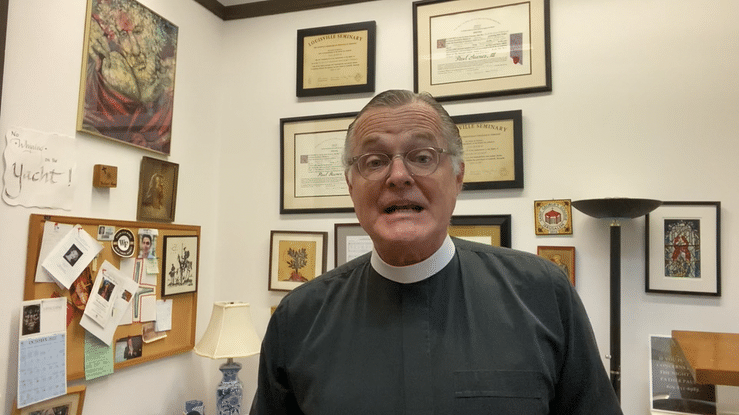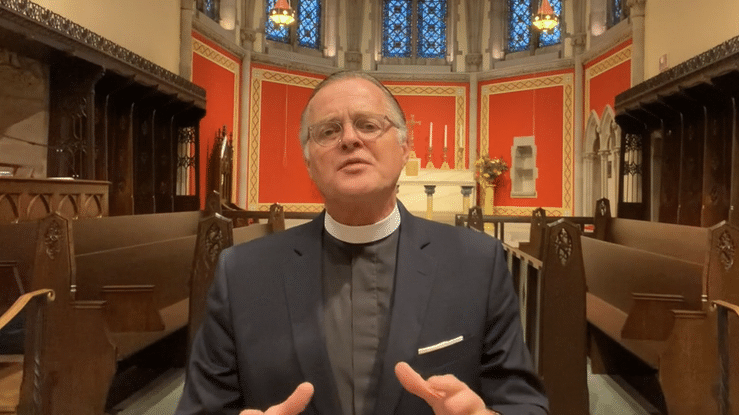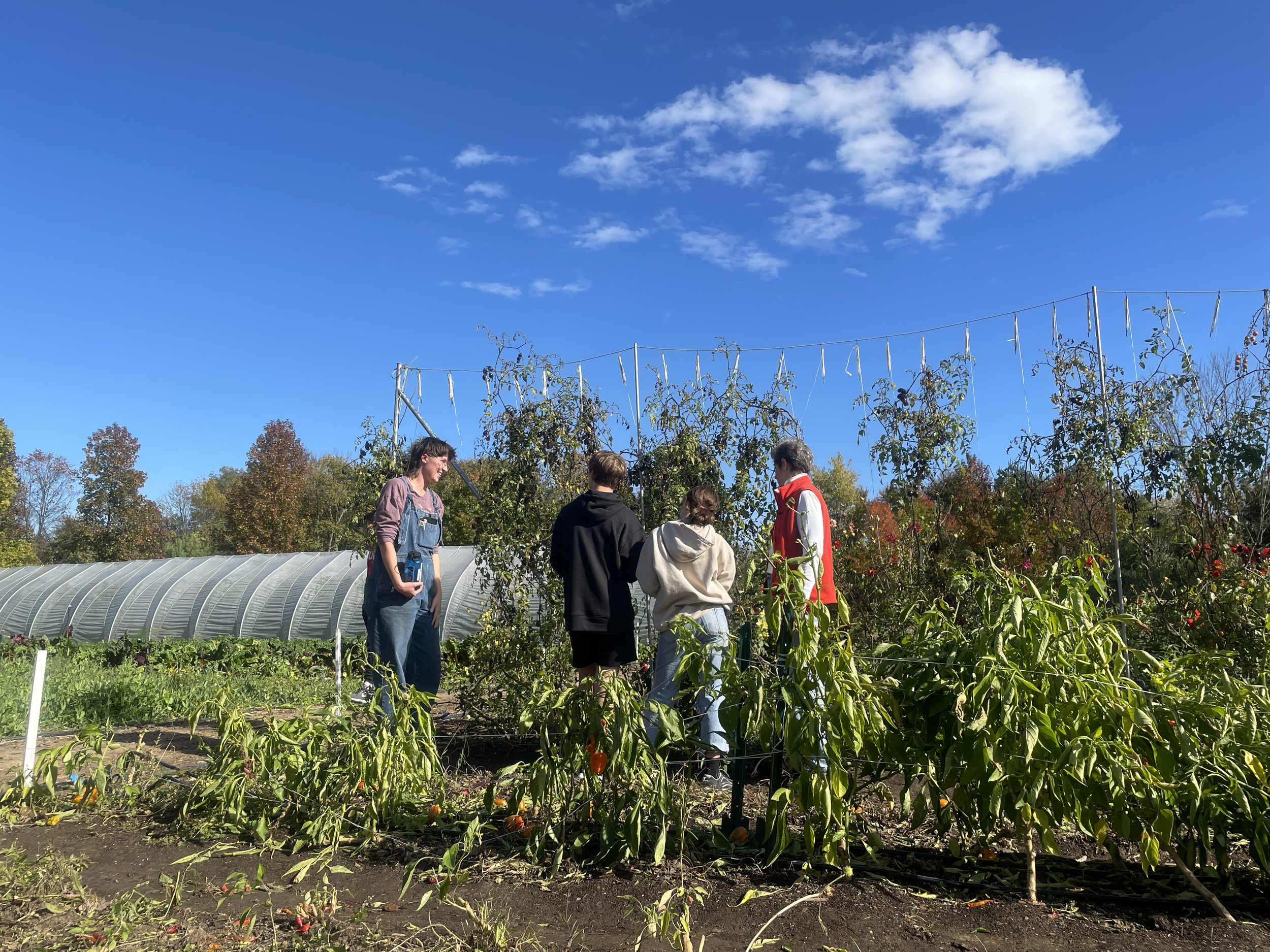[Video] Let Us Walk Together!
Twenty-first Sunday after Pentecost
You are my hiding-place; you preserve me from trouble; you surround me with shouts of deliverance.— Psalm 32:8
Isaiah 1:10-18
Brother Bartholomew and the Apple Grove, by Jan Cheripko (K+)
2 Thessalonians 1:1-4, 11-12
Paul Writes (a Letter), by Chris Raschka (Grade 1+)
Luke 19:1-10
Wings, by Christopher A. Myers (PreK+)
For Halloween
Zen Ghosts, by John J. Muth (PreK+)
For All Saints
The Name Quilt, by Phyllis Root (PreK+)
This week’s text from Isaiah reads like a counterpoint to the alternative lectionary text from Habakkuk. In Habakkuk, the prophet is surrounded by destruction. He cries out, “how long?” but resolves to wait and watches for the Lord to act. In Isaiah’s prophecy, the Lord has grown tired of waiting for the people to follow her God. The people spend all their time planning extravagant festivals, when what God wants is for them to “do good, seek justice, rescue the oppressed, defend the orphan, plead for the widow.” Jan Cheripko’s book, Brother Bartholomew and the Apple Grove, connects to this idea of doing justice and the importance of justice for worshiping God well. In the story, the young monk Bartholomew learns about justice by tending an orchard. This orchard is an important source of food for his small community of monks. When he first begins to take care of the trees, he comes up with lots of plans to take care of them, so that they will produce lots of fruit. One of the first things he does is to fix the fence surrounding the orchard to keep the animals out. But when a stag is injured on the fence, Brother Bartholomew learns that keeping the animals out is not truly just. God will still provide enough for the monks to eat, even if the deer and other animals get in and munch up some of the fruits. How might you practice justice in your own lives? How might our church community practice justice together?
Our epistle text this week come from Paul’s letter to the Thessalonians. Paul, as you know, wrote lots and lots of letters to small church communities all over the Mediterranean. He also travelled constantly to visit these churches and to encourage them as they lived out their faith in Jesus. This letter begins with encouragement – Paul is so proud of the Thessalonian church for being faithful and brave, even when things get difficult. Have you ever received a letter full of encouragement? Have you ever sent someone a letter like this? Chris Raschka’s book, Paul Writes (a Letter), is a colorful celebration of Paul’s lively correspondence. After reading this book, you might try writing your own letters. Who would you like to encourage? You can write something simple, like “I’m glad I know you!” or “Hey, I was thinking about you today, and I want you to know how much I love you!” Say a blessing over the postcard or letter and drop it off in the mailbox.
Our gospel text from Luke is the story of Zacchaeus, the tax collector, who climbs up a sycamore tree just to get a glimpse of Jesus when he passes through town. Jesus sees him, and he tells Zacchaeus, “Hurry up and climb down because I’m coming to stay at your house.” Because he was a tax collector, Zacchaeus was an outcast – no one trusted him. Jesus’s visit is an experience of grace that gives him a fresh start. Christopher A. Myers’ book, Wings, tells the story of Ikarus,
who is an outcast at his school because he has wings. One of his classmates overcomes her shyness in order to stand up for Ikarus. Her bravery is an expression of grace that transforms them both. Remember that sometimes compassion takes bravery, and that you can be brave with God’s help. Have you ever been left out until someone noticed you, and reached out to include you? How did that feel? Have you ever reached out bravely with compassion when someone else being excluded? How did that feel? What helped you to be brave in that moment?
Finally, next week, we will celebrate All Saints’ Day, after Halloween. One of my favorite Halloween books is Zen Ghosts, by John J. Muth. Stillwater the panda tells a ghost story to his human friends, Addie, Michael, and Karl. Muth’s watercolor illustrations are hauntingly gorgeous, and Stillwater’s story-within-the-story is provocative and multilayered. The Name Quilt, by Phyllis Root, connects well to All Saints’ Day. Sadie’s grandmother has a quilt with the names of generations of relatives stitched into the squares. At bedtime, Sadie points to names on the quilt and her grandma tells her stories of their ancestors. All Saints’ Day is the perfect occasion to share family stories of our ancestors and their faith. What are your favorite family stories?
*
Whenever possible we’ll share links to independent to booksellers. Please consider supporting local and other indepedent bookstores.
Kyra and Jolyon Pruszinski Delve into Racial History
Kyra and Jolyon Pruszinski, parishioners since 2012, have recently begun formal research for the Church on slavery in the Diocese of New Jersey. Kyra has been hired this year by Trinity to document our parish history with respect to slavery, building on the work done last year by Abigail Edwards during her gap year. Kyra has had a longstanding interest in history, anti-racism, and advocacy, and was a founding member of the People of Color Advocacy Group at West Windsor Plainsboro High School South.
Her dad, Jolyon, was recently hired by the Diocesan Reparations Commission to perform similar work at the Diocesan level. Jolyon comes to the job having worked for the past five years as a Lecturer in the History and Religion Departments at Princeton University. The position will involve a combination of archival work with individual parishes and documentation of this data within the broader historical sweep of social, legal, and religious developments from the colonial era to the present.
He writes: “The history of the Diocese is complicated. There are a lot of ways in which white New Jersey Episcopalians supported slavery and oppressed Black Americans, though at times some white Episcopalians resisted such actions. But there are also many instances of Black Episcopalians who faithfully made a way for themselves in spite of the actions of their white Episcopal siblings in the faith. These stories need to be remembered and lifted up. We can’t repair damage we don’t know about or won’t admit to. We can’t make a better future without remembering the past. It is important to bring these things to light so that we can do the right thing in the present.”
Save the Date: St. Nick’s Christmas Party
Experience Early Modern Anglicanism
On Sunday at 5pm, we will hold a service of Evening Prayer with Communion from the 1662 Prayer Book, and at the 9:30am forum, we’ll have an opportunity to learn more about Anglican liturgy of the 16th and 17th centuries. Introduced soon after the restoration of the monarchy, the 1662 Book of Common Prayer is a light revision of its predecessor, the 1559 book. In its own time, it was seen as a compromise between catholic and Reformed practice in the Church of England. To our eyes, however, it seems deeply Protestant. Many aspects of our current liturgical practice are absent: colors in hangings and vestments, candles on the altar, and most of the ritual gestures that you would see in an Episcopal service today.
The 1662 service reflects the influence of the Reformers, as it is deeply grounded in the reading of Scripture. Most of the music is based on the Psalms, the original songs of praise that were so important in the Reformation. The communion service is celebrated from the “north end” of the altar to avoid any implication that the Eucharist repeats the sacrifice of Jesus offered once for all on the Cross, or that the priest is a mediator between the people and God. Because Communion was a more infrequent service, it would be added on to the end of Morning or Evening Prayer which were the regularly scheduled services of the Church.
While the format of the 5pm service may feel different, many of the prayers can be found in almost identical wording in Rite I of our current Prayer Book. Through the Prayer Book tradition, we are connected with our ancestors in the faith, and we hope that connection will enliven your faith today. Come and see!
Our Director of Communication, Adam Bond, in addition to serving as clerk for the 5pm service will be displaying before and after both the 9:30am forum and 5pm service folio editions from his personal collection of the Book of Common Prayer printed in 1662 (rebound in the 1850s) and the first complete print edition of Richard Hooker’s “Of the Lawes of Ecclesiasticall Politie” printed in 1723 in its original binding.
Youth Group at Farminary
The weather was picturesque on Sunday afternoon, October 16. It was one of those glorious fall days when everything sparkles in the slanting golden light. That was the day Trinity’s Youth Group took a field trip to the Farminary. What is the Farminary, you ask? Well, it’s the name of Princeton Theological Seminary’s farm, where students can combine theological learning and reflection with a sense of place and ecological education.
The best way to get a full sense of the Farminairy is to visit their website.
When the fourteen of us arrived, Brendan and Jack, our hosts for the afternoon, met us by the barn. They are both PTS students who work at the Farminary. After a round of introductions, Jack invited us to look around and notice —notice the sounds, the smells, the light, the breeze, the pond surrounded by cattails, birds circling overhead, colorful flowers, green grass — and the quiet. In moments we changed from feeling a bit awkward in this unfamiliar place to feeling curious about what was just beyond the wild apple tree we were sitting under.
Brendan led us to the garden. On the way, we passed by a long mound of compost, made of woodchips, food scraps, and leaves. He dug down into it so we could see and feel how the decomposition of this organic heap got steaming hot. We could smell its aroma of really good, rich dirt.
Venturing into the garden, we snacked on emerald green arugula fresh from a bed of four week old greens, plucked velvety green beans off vines climbing up poles, chomped on radishes and turnips freshly pulled out of the dirt, and delighted in the sweetness of purple and gold kumquat tomatoes, and the bitterness of red chard. The abundance of crops and the plenty of nature made us wonder why anyone goes hungry in the United States.
If only we would provide, share, and distribute fairly. Our young people recognize this is a problem they will one day have the power to solve.
We made our way through the trees into an open field, home to the chicken coop.
Fun fact: If you ever go to Jammin’ Crepes on Nassau Street, you might have Farminary eggs in your crepe! Brendan introduced us to the flock, as he expertly caught and picked up a chicken. The trick, he said, is to walk up behind the bird and hold its wings to its sides as you lift. Suddenly twelve teenagers stepped over the fence, into the chicken coop enclosure, to give it a try! The chickens had mixed feelings about our enthusiasm.
Before we knew it, almost two hours had passed!
We walked back to the circle of chairs where we had started. As we snacked on apples, we talked about the creation story in Genesis. The idea that humans were made by God out of dirt inspired our thoughts differently after exploring the farm.
Back under the wild apple tree we wondered about the full quadrant of the garden that was growing what looked like only weeds. Jack explained it was actually cover crop—that part of the garden was already resting for the winter. Even the soil needs rest in winter, and rest from growing certain kinds of crops, to avoid depletion. We reflected for a moment on the sacred need for rest, that God rested on the seventh day, and that we must all rest or we cannot grow.
What stands out for all of us in the Youth Group, when we think back on that lovely October Sunday, was how restful and calm the afternoon had been. Our hosts graciously shared their love of the farm, their joy of growing things, and their stewardship of Creation as a reflection of their devotion to God. With an easy pace and contemplative approach we soaked in what the Farminary had to teach us about God and ourselves as creatures, as individuals, and as a group.
We want to go back and visit again. We’ll let you know — we’d love you to join us!
& Trinity Youth Group
Save the Date: Turkey Trot 2022
A great way to start Thanksgiving Day!
SAVE THE DATE
November 24, 2022
at 8:30am
We are back with an in-person run this year! PLEASE RUN, VOLUNTEER, AND SPONSOR! Our in-person race permit was approved and online registration is now open for Trinity Turkey Trot. As always, we’ll run/walk Thanksgiving morning at 8:30am.
Visit the Turkey Trot website for more information and to sign up for our benefit 5K!
All proceeds benefit Outreach charities:
Arm in Arm (Crisis Ministry), Housing Initiatives of Princeton, Trenton Children’s Chorus and Urban Promise Trenton. We are also looking for race leadership volunteers. Leverage your passion for running, walking and/or project management for a great cause!
Please consider volunteering and remember to bring in canned food to donate to Arm In Arm on race day. There will be an Arm In Arm truck on hand to collect donations to their food pantries in Princeton and Trenton.
If interested in sponsorship opportunities, volunteering, or joining the Turkey Trot team, please contact Maureen Westerman at turkeytrotprinceton@gmail.com.































